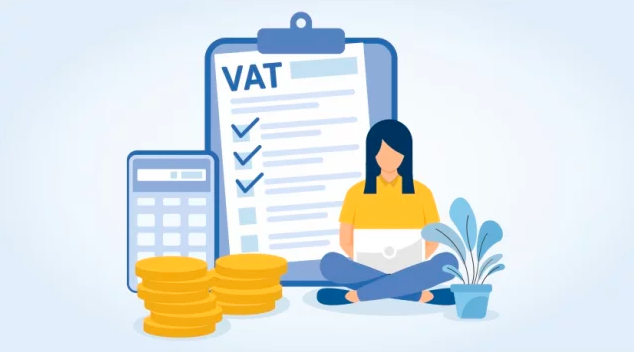
VAT Administrative Exception in the UAE: Guidelines and Procedures
The Federal Tax Authority (FTA) recently released the guidelines concerning the procedures and scope for certain exceptions to VAT obligations. According to the newly implemented principle, eligible tax registrants can apply for a VAT administrative exception in the requirement for raising tax invoices, and credit notes, changing the length of the tax period, changing the tax stagger, and other categories. It fundamentally serves as a lifeline for businesses facing challenging circumstances by offering them some liberty in adhering to the strict procedural aspects of UAE’s VAT regulations.
This guide will prepare you with significant information and details regarding the VAT Administrative Exception request, including an overviewof the categories for which the request can be made.
VAT administrative exception: Explained
VAT Administrative Exception is basically a mechanism for registrants with exceptions as per the Federal Decree-Law No. 8 of 2017 on Value Added Tax (“Law”) or Cabinet Decision No. 52 of 2017 on the Executive Regulations of the Federal Decree-Law No. 8 of 2017 on Value Added Tax (“Executive Regulations”) if certain circumstances prevent them from following certain procedural aspects of the Law or the Executive Regulations.
These exceptions are relevant to VAT only and are grouped into certain categories, which we will cover later in this blog.
Eligibility to make VAT administrative exception request
The following eligibility requirements need to be met in order to apply for VAT administrative exception in UAE:-
· The applicant must be registered with the FTA for VAT
· The requirements concerning the relevant Exception Request must be met
· All documents supporting the request needs to be submitted
Categories covered under VAT administrative exception in UAE
Registrants applying for VAT Administrative Exception Requests are entitled to only certain specified categories. These categories are listed below:-
Tax invoices –
Article 59(7) of the Executive Regulation states that the tax registrants can request to not mention particulars specified in Article 59 of the Executive Regulation for Tax Invoices, or not issue Tax Invoices in certain cases. If the entity is able to produce sufficient records to establish the particulars of the supply or class of supplies and it would be impractical to issue a tax invoice, then only the FTA will consider an exception request to tax invoice requirements
Tax credit notes –
Article 60(2) of the Executive Regulation allows an exception to not mention particulars as prescribed in Article 60 of the Executive Regulation for Tax Credit Notes, or not issue Tax Credit Notes in certain cases. This exception will be allowed if the tax registrant is able to present sufficient records to establish the particulars of the supply or class of supplies, and it would be impossible to issue a Tax Credit Note.
Length of the tax period –
Article 62 (2) of the Executive Regulation allows VAT registrants to request a change in the length of the Tax Period. However, they need to present a valid reason for this request before the FTA. If the request is made to change the length of the tax period to half-yearly, then the consideration will be given only to categories such as individuals, businesses in refund positions, and SMEs. Nevertheless, it requires the provision of specific information depending on the categories –
· Individuals: Board members, property owners, and freelancers can request the FTA for a change in the Tax Period. They must submit the details about the number of invoices issued and the total tax paid in the previous 12 months. The FTA will consider all the supplies made by these individuals and decide accordingly.
· Businesses in refund positions: Businesses in a continual refund position throughout the tax period in the previous 12 months and are expected to remain in the same position can apply for exception requests. However, the request will be considered based on the condition of whether the business expects any change in its model that may eventually result in a change in its refund position.
· SMEs: Registered SMEs that are officially funded by the government can apply for a change in their tax period by submitting the records for the total tax paid and the taxable supplies for the past 12 months. On the other hand, SMEs without any government funding and have taxable supplies equal to or less than AED 5 million in the preceding 12 months can submit their VAT Administrative Exception requests along with their records of total tax paid, taxable supplies, or any penalties paid in the previous 12 months.
Tax stagger –
Article 62(3) of the Executive Regulation allows tax registrants who are on quarterly filing to request a change in the assigned tax stagger so that the tax period ends with their requested month. Nonetheless, they need to provide valid reasons for requesting the change.
Evidence to prove the export of goods –
VAT-registered entities in the UAE can request the tax authorities to permit the use of an alternative form of evidence to prove the export of goods. After reviewing, the FTA may stipulate an alternative form of evidence aligning with the nature of the export or the nature of the goods being exported. Article 30 (6) of the Executive Regulation states that the registrant needs to provide the actual reasons or circumstances for the request and provide details of the alternative evidence proposed by the tax authorities.
Time for the export of goods –
FTA allows registrants to request an extension of time to physically export goods outside the UAE. Upon reviewing the request, the authorities may extend the 90 days from the date of supply. Nevertheless, Article 30(7) of the Executive Regulation stipulates that the registrants must provide the actual reasons or circumstances for seeking an extension of time for the export of goods.
If you need relevant advice for VAT Administrative Exception categories, consult with the tax consultants at Shuraa.
Submitting a VAT administrative exception request in the UAE
The VAT registrants in the UAE can submit the VAT Administrative Exception request through their Emaratax portal on the FTA’s website. If, in any case, the registrant is not able to perform the task, the following people can submit the request on their behalf:
· The authorized signatory
· The appointed tax agent
· The appointed legal representative
· A representative member (if the applicant is a tax group)
The tax agents at Shuraa Tax can help you in this process and submit your request without any potential delays or mistakes.
Input required in the VAT Administrative Excepapplicationtion form
Tax registrants are required to complete the application form and explain why they are seeking a VAT Administrative Exception in the UAE. The following details are required in the process:-
· A valid description for making a VAT Administrative Exception Request according to the criteria
· A supporting letter providing a detailed background and the set of facts that support the request, further specifying the reasons for not meeting the legal requirements that resulted in the need for the exception
· Evidence supporting the factual and legal basis on which the request is made (for example, sample invoices, contracts, payment slips, etc.)
Seek expert help for all your UAE VAT requirements
The process of submitting a VAT Administrative Exception Request in the UAE can be complex. However, with the assistance of Shuraa Tax consultants, you can complete the process in accordance with the relevant laws and regulations.
Shuraa Tax and Accounting Consultancy has a dedicated team of tax experts serving clients worldwide for years. Not only are they FTA-approved agents, but they also offer end-to-end tax solutions for businesses of all sizes. Their other services include excise tax and corporate tax consulting services.
Talk to the consultants of Shuraa Tax for all your tax-related concerns.




